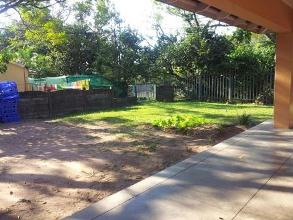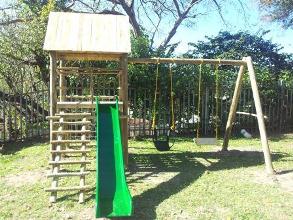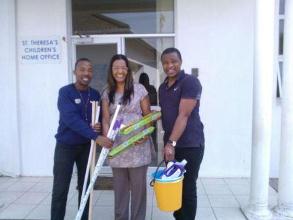Giving back to communities: Experiences of second year Child and Youth Care students at DUT
By Ms Thobile Hlengwa and DUT second year Child and Youth Care students
‘It always seems impossible until it is done’.
– Nelson Mandela
As part of the second year of the Child and Youth Care course at DUT, students register for a subject called Community Development Facilitation. The subject aims to equip students with the knowledge and skills to effectively engage communities in their own development.
Community engagement is in line with the Inter-ministerial committee on young people at risk (1996) document which recommends that the child and youth care system should focus more on preventative and early intervention measures to avoid children coming unnecessarily into care. Touching lives and making a difference in the lives of children and youth is what Child and Youth Care work is about.
It is for this reason that Ms Hlengwa decided to get the students involved in community engagement projects so that they are able to apply what has been learnt in class.
Winfield (2006, p 1) emphasized that ‘Theories are an abstraction of the world, and as such, can never provide a holistic framework for understanding events, particularly events involving the social world’. As such, the projects were integrated into the work integrated learning experience of the students. As part of their work integrated learning, the students were placed at various child and youth care centres around Durban. 
Students were involved in various projects. These included the installation of good quality jungle gym, a washing line, converting a store room into a library, safe and clean (cleaning material), library renovation and renovation of the room for the child and youth care assistant.
The students confidently drew knowledge from the theory of people-centred development and appropriately implemented its principles. Working within a team with young people and the child and youth care supervisors from the placement organisations, they identified the needs to be addressed. These needs strongly impacted on the lives of young people in each organisation that they worked with at William Clarke Gardens, Durban Children’s Home, St Teresa children’s Home, St Philomena’s Children’s home and Aryan Benevolent Home. In addition, the students had to work with the management of the organisation to write up the funding proposal.
Benefits
The benefits for the lecturer was to see students working hard in trying to put theory into practice. Students benefitted through the first hand profound experience of engaging with a community. The young people in the organisation also benefited as they now have libraries –to stimulate cognitive development; jungle gym for outdoor play that helps physical development etc.
Challenges
The students realized that community engagement has its own challenges. This reality unfolded when they were faced with tensions related to deadlines and personality clashes that emerged within their own groups. This is because some group members felt that others were disrespectful dictators who wanted to order them around, while other members thought that their peers were not cooperative and did not pull their weight.
After the completion of one of the projects, the management of the organisation felt that students work was not good enough and as a result removed what they felt was not good enough. This had a negative impact on the self esteem of the students involved in that project. Other challenges included some organisations failing to give students the support they needed and some prospective funders either shutting their doors on students’ faces or promising to deliver but later changing their minds. One of the students commented that “At some point it felt like even our lecturer Ms Thobile Hlengwa threw us in the deep –end and left us to swim to the shore”.
Despite these challenges the students’ passion for helping young people encouraged them not to give up until the project was completed. It is worth mentioning that some projects did not materialise because of the situations that were beyond students’ control such some of the organisations not wanting students to ask for donations using their name because of previous negative experiences.
In thinking about the experiences of this group of students, the words of Martin Luther King and Adam Smith seem befitting “Every man must decide whether he will walk in the light of creative altruism or in the darkness of destructive selfishness” (Martin Luther King).
“To feel much for others and little for ourselves; to restrain our selfishness and exercise our benevolent affections, constitute the perfection of human nature” (Adam Smith).
There is no doubt that this initiative eventually filtered and had a ripple effect on the children and youth within the child care centres.
Funders
We are most grateful to the selfless funders who were willing to contribute to the students and make their projects a success thus making a difference in the lives of young people. Javed Abdulla for FazePak cc; Shaun for Durkal Industries; Mr Mike from Nestle; Sam Mothala from Electra Distributors; George Naidoo; Bassa’s Hardware and Mr O Desai.







